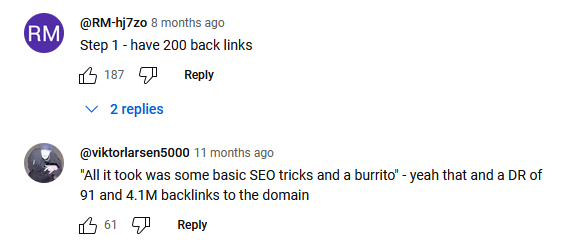I've come across some information on the web, claiming that if your page is not ranking high enough for a certain keyword (but ranking nevertheless, e.g. it appears on the SERP at least somewhere; we're not talking about cases when it's behind the top-100), it can be a sign that Google doesn't consider your content to be good enough, and that rewriting it can help you climb up. So basically the claim is that Google somehow evaluates the quality of your content, and for example even if the article semantically matches the target keyword but fails to cover some adjacent points, it can be a reason for the page performing sub-optimally for the target keyword. In other words, it is claimed to be a relevancy issue.
Where does it come from?
For example, in this video from Ahrefs I Tried to Rank #1 on Google in 24 Hours to Prove a Point Sam claims @0:40 that "when a page isn't ranking high, it's usually because there's an issue with the content itself". In the video he rewrites the content of one of the pages on Ahrefs' blog a little bit, covering some additional points, that their competitors were covering and they were not, and the page jumped from position 7 to position 1 on mobiles and to position 6 on desktops.
To be fair, Sam also mentions that the reason for this might as well be that "the page just doesn't have enough quality backlinks compared to the other top results", but I feel like this point is missed completely by a lot of people (and a little underrepresented in the video itself, to be honest), and I see a lot of comments in various discussions claiming that simply rewriting the content can help you rank higher.
My case study
At some point I started to hear this claim so often, that I decided to conduct a case study. I took one of the pages of my eCommerce SaaS website that was bouncing between positions 20 and 30 for its main keyword (medium keyword difficulty), researched the competitors that were holding the top-10, gathered every single point that they were covering and I was not, and rewrote the content of the page, covering all of these points. I also added some additional information that I thought would be useful for the reader and made a neat table of contents. The volume of the article increased from 2,000 words to 8,000 (yeah, I know that quantity does not equal quality, but I assure you that I did my best, no copy-paste, no AI, no fluff, just hand-written content to the best of my knowledge of the topic, which presumably is quite decent, as I've been working in the niche for a few years now). So it basically became the most comprehensive piece of content on the topic.
No off-page SEO was done during the experiment, the only thing that was changed was the content of the page.
The results
The results? Absolutely none. I waited for several months, but the page proceeded to bounce around the same positions as before as if nothing had changed.
The conclusion? This is clearly an authority issue, not a relevancy one. And the fact that the page was already ranking (albeit not high enough) is a clear sign that Google considers the content to be relevant to the keyword. The competitors that were holding the top-10 were simply more authoritative than me (i.e. had more quality backlinks). Some of them even had very thin content, literally like 1 or 2 paragraphs, and still ranked in the top-10, which is another hint that content is not the issue.
Maybe if you have an authoritative domain like Ahrefs, and you are already ranking in the top-10 for competitive keywords, some content tweaking here and there can help (or if the keyword difficulty is low). There's also a hypothesis that simply updating the content of the page once in a while can give you a temporary boost, there are even some AI-driven WordPress plugins that do that automatically for you. But:
Key takeaway
If you lack authority (i.e. backlinks), no amount of content rewriting can help you rank higher for competitive keywords.
I think those comments under the aforementioned Ahrefs video sum it up nicely:

Let's discuss!
Join the conversation on: x.com


